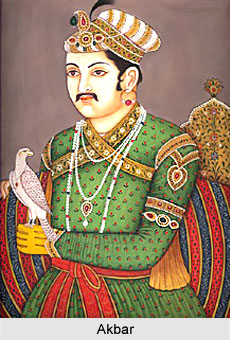 Abul Fazl is credited with having provided the most comprehensive account of the Mughal Empire in two of his celebrated works, the Akbarnama and the Ain-i-Akbari. Born to Sheikh Mubarak in 1551, Abul Fazl was a historian and one of the Navratna`s (nine gems) of Emperor Akbar`s court. He distinguished himself as a soldier and a skilled administrator, and was very close aide of the emperor. In fact it is believed that a large part of Akbar`s liberal outlook was influenced by his association with Abul Fazl.
Abul Fazl is credited with having provided the most comprehensive account of the Mughal Empire in two of his celebrated works, the Akbarnama and the Ain-i-Akbari. Born to Sheikh Mubarak in 1551, Abul Fazl was a historian and one of the Navratna`s (nine gems) of Emperor Akbar`s court. He distinguished himself as a soldier and a skilled administrator, and was very close aide of the emperor. In fact it is believed that a large part of Akbar`s liberal outlook was influenced by his association with Abul Fazl.
The relationship between Akbar, a soldier of Turkish descent, and Abul-Fazl, an Indian Muslim brought up in the Persian school of science and administration, epitomizes the strengths of the Mughal Empire itself. In his works, Abul Fazl provides a vivid description of the administrative, economic, social and political set-up of the Mughal Empire as well as the exploits and achievements of the Emperor Akbar.
The Akbarnamah, which took seven years to be completed, was commissioned by Akbar as a biographical account of his life and times. It offers a vivid and vital record of the role of Akbar in the establishment of the flexible diplomatic and economic system which was to sustain the empire for the next century. Written in two parts, the first part of Akbarnamah deals with the reign of Akbar. This can further be seen as two volumes- the first dealing with the Lineage of the great Emperor and tracing the Descendants of Timur right uptil Akbar`s birth. This part also chronicles his reign in the first seventeen years of his life. The next part deals with the reign of Akbar right uptil his forty -sixth year. It was at this point that Abul Fazl`s work stops as he was assassinated on Jahangir`s orders. The work on Akbar`s reign till his death was added by Inayat Ullah.This is known as the Takmil-i-Akbarnama.
The second part of the book entitled the Ain-i-Akbari is a complete account of the administrative system that flourished under Akbar`s reign. It is a descriptive list of the political and religious institutes that were constituted to govern the empire. In it is found a statistical record of the size of different territories, the market trends and prevailing prices, the men in power and the strength of their armed forces, tax collection, history of the various provinces, the responsibilities and functions of important office holders of the state as well as a whole lot of other technical details of the functioning of the Mughal Empire. The Ain-i-Akbari is noted for containing the famous` Account of Hindu Sciences` whereby Hindu beliefs and tradition are sought to be explained to the Muslim masses with a view to increasing tolerance. This is reflective of the Emperor`s interest in his Hindu subjects and his liberal outlook towards religion.



















